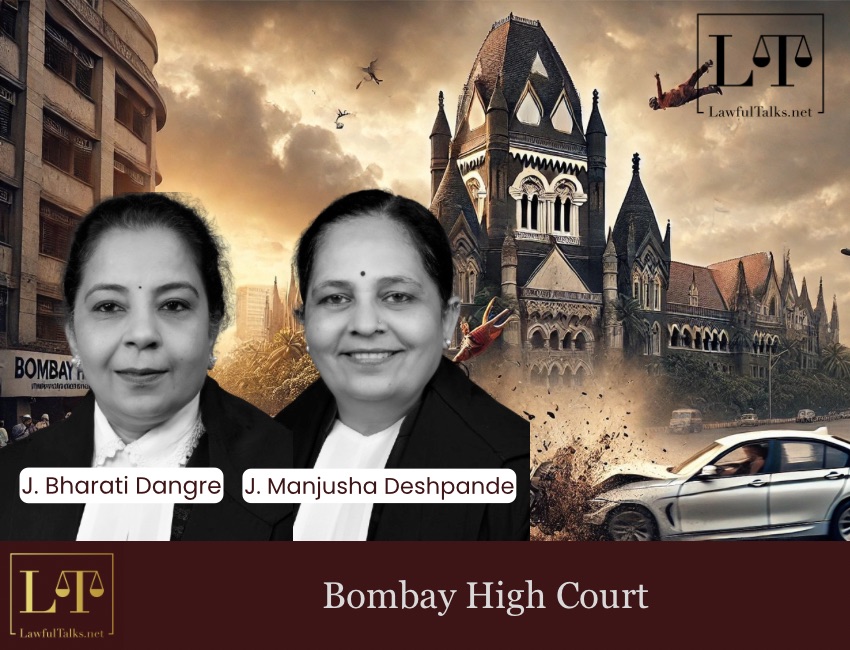Allahabad HC Sets Aside Afzal Ansari's Conviction, Allows Him to Continue as MP

Procedural Lapses Cannot Undermine Justice in Serious Offenses
The Bombay High Court Division Bench presided by Justices Bharati Dangre and Manjusha Deshpande, recently addressed the legality of arrests in a tragic road accident case involving the death of Kaveri Nakhwa. The accused petitioners contended that their arrests were illegal due to the failure to communicate written grounds for their detention. However, the court concluded that the absence of written grounds did not invalidate the arrests, as the petitioners were aware of the reasons for their detention.

On the morning of July 7, 2024, Pradeep Nakhwa, a fisherman, and his wife, Kaveri, were traveling on their scooter toward Worli Koliwada. As they approached Dr. Annie Besant Road, a speeding BMW collided with their vehicle, throwing both riders off. Kaveri tragically became trapped under the car’s bumper and was dragged for over two kilometers before her body was discovered at the Worli Sea Link T-junction.
The car, a white BMW, sped off after the collision. Despite being injured and in shock, Pradeep noted the car’s details and approached the Worli Police Station. At the same time, police received information that Kaveri’s body had been found. The incident led to the registration of an FIR under Section 105, 281, 125 (b), 238, 324 (4) of the Bhartiya Nyaya Sanhita, 2023 along with Section 184, 134 (A), 134 (B) r/w 187 of Motor Vehicle Act, 1988..
The police investigation swiftly identified the BMW involved in the accident. The vehicle was found near Kalanagar Junction in a damaged condition, with two individuals, Rajrishi Bindawat and Rajesh Shah, present at the scene. Bindawat was arrested the same day, while the primary accused, Mihir Shah, evaded capture until July 9, 2024.
Evidence against the accused included CCTV footage, witness statements, and forensic findings. The CCTV recordings revealed that Shah and Bindawat had exchanged seats before and after the accident. Statements from witnesses, including a toll booth operator and a traffic marshal, further corroborated the reckless driving and subsequent flight from the scene.
The accused challenged their arrests, arguing that the authorities had failed to comply with constitutional and statutory requirements by not providing written grounds for their arrest. They relied on Article 22(1) of the Constitution and Section 47 of the Bhartiya Nagrik Suraksha Sanhita, 2023, which mandate that arrested individuals be informed of the reasons for their detention.
Their counsel cited landmark rulings, including Pankaj Bansal v. Union of India (2024) 7 SCC 576 and Prabir Purkayastha v. State (NCT of Delhi) (2024) 8 SCC 254, where the Supreme Court emphasized the necessity of written communication of arrest grounds.They contended that oral explanations or subsequent disclosures in remand applications were insufficient to satisfy the constitutional requirement.
The prosecution, on the other hand, emphasized the seriousness of the offense and the compelling evidence against the accused. It argued that the circumstances necessitated immediate arrests and that the accused were made aware of the reasons for their detention through detailed remand applications.
The prosecution further highlighted the conduct of the accused, particularly Mihir Shah’s attempt to evade arrest, as evidence that they were aware of the charges against them. The gravity of the offense, combined with the accused’s actions, justified the procedural lapses, if any, according to the prosecution.
The Bench acknowledged the importance of procedural safeguards under Articles 21 and 22, but emphasized that these should not be used to undermine justice, especially in cases involving severe offenses.
The bench made critical observations regarding the legal implications of the failure to communicate arrest grounds. As the bench observed, "the right to be informed of the grounds of arrest flow from Article 22(1) of the Constitution, which prescribe the protection against arrest and detention, by providing that no person who is arrested shall be detained in custody without being informed, as soon as may be, of the grounds for such arrest nor shall he be denied the right to consult, and to be defended by, a legal practitioner of his choice."
The bench also noted, "the purpose of the safeguards of Sec. 47 BNSS and Article 20 of the Constitution is for the sole purpose of effective representation."
Although the court acknowledged that written grounds of arrest were not provided at the time of the accused’s apprehension, it found that the accused were well aware of the reasons for their detention through the remand applications and surrounding circumstances. The bench concluded that the absence of written grounds did not invalidate the arrests, especially in light of the overwhelming evidence against the accused and the gravity of the offense.
The judgment also emphasized the evolving recognition of victimology in Indian law. The bench pointed out the limited focus on victims within the adversarial criminal justice system, noting that Pradeep Nakhwa’s presence during the hearings reflected his ongoing fight for justice. The court lamented the lack of mechanisms that adequately address the trauma and loss experienced by victims in the criminal process.
In conclusion, the Bombay High Court dismissed the writ petitions filed by the accused, who sought release on the grounds of illegal arrest due to the failure to communicate written grounds of arrest. The court emphasized that while procedural safeguards are crucial, the seriousness of the offense and the overwhelming evidence against the accused outweighed the procedural lapse. Since the accused were aware of the reasons for their arrest, the court found no merit in the petitions and dismissed them with no order as to costs.
Case Details- Rajrishi Bindawat v. State of Maharashtra
Advocate for the Petitioner - Mr.Niranjan Mundargi a/w Ujjawal Gandhi, Keral Mehta
Advocate for the Respondent - Mr.H.S. Venegavkar, PP a/w Ms. M.M. Deshmukh, APP








































































































































































































































































































































































































































































































































































































































































































